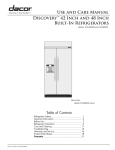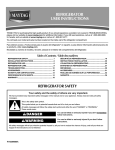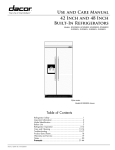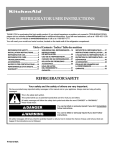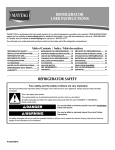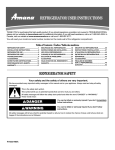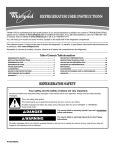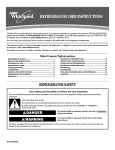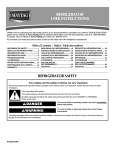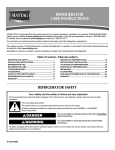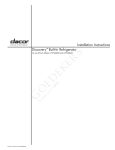Download Dacor 107309 Product data
Transcript
Use and Care Manual Discovery ™ Custom Panel Built-In Refrigerators Models: DYF42BNDI and DYF48BNDI Style varies. Table of Contents Refrigerator Safety.................................................. 1 Important Information.............................................. 2 Before Use............................................................. 2 Refrigerator Operation............................................ 3 Care and Cleaning............................................... 10 Troubleshooting.................................................... 12 Warranty and Service........................................... 13 Product Data Sheets.............................................. 15 Français............................................................ 17 Part No. 107309 Rev. A/W10556315 © 2013 Dacor, all rights reserved Refrigerator Safety Your safety and the safety of others are very important. We have provided many important safety messages in this manual and on your appliance. Always read and obey all safety messages. This is the safety alert symbol. This symbol alerts you to potential hazards that can kill or hurt you and others. All safety messages will follow the safety alert symbol and either the word “DANGER” or “WARNING.” These words mean: DANGER WARNING You can be killed or seriously injured if you don't immediately follow instructions. You can be killed or seriously injured if you don't follow instructions. All safety messages will tell you what the potential hazard is, tell you how to reduce the chance of injury, and tell you what can happen if the instructions are not followed. IMPORTANT SAFETY INSTRUCTIONS WARNING: To reduce the risk of fire, electric shock, or injury when using your refrigerator, follow these basic precautions: Plug into a grounded 3 prong outlet. Do not remove ground prong. Do not use an adapter. Use nonflammable cleaner. Do not use an extension cord. Disconnect power before servicing. Keep flammable materials and vapors, such as gasoline, away from refrigerator. Use two or more people to move and install refrigerator. Replace all parts and panels before operating. Remove doors from your old refrigerator. Disconnect power before installing ice maker (on ice maker kit ready models only). Use a sturdy glass when dispensing ice (on some models). SAVE THESE INSTRUCTIONS Proper Disposal of Your Refrigerator WARNING Suffocation Hazard Remove doors from your old refrigerator. Failure to do so can result in death or brain damage. IMPORTANT: Child entrapment and suffocation are not problems of the past. Junked or abandoned refrigerators are still dangerous, even if they sit out for “just a few days.” If you are getting rid of your old refrigerator, please follow the instructions below to help prevent accidents. Before you throw away your old refrigerator or freezer: Take off the doors. Leave the shelves in place so children may not easily climb inside. 1 Important Information Installer: Please leave this guide with this appliance. Have the complete model and serial number identification of your refrigerator ready. These numbers are found on a serial number label, located on the right side of the refrigerator liner. Record these numbers on this page for easy access. Consumer: Please read and keep this use and care manual for future reference. This guide provides proper use and maintenance information. Keep this guide and the sales receipt and/ or cancelled check together for future reference. Proof of original purchase date is needed for warranty service. Model number ________________________________________ Serial number ________________________________________ IMPORTANT: If you receive a damaged product, immediately contact your dealer or builder. Do not install or use a damaged appliance. Date of purchase______________________________________ For service and warranty information, see page 13. Since Dacor constantly improves the quality and performance of our products, we may need to make changes to the appliance without revising this manual. If you have any questions, call: Dacor Customer Service (800) 793-0093 (U.S.A. and Canada) Monday — Friday 6:00 a.m. to 5:00 p.m. Pacific Time Visit www.dacor.com to download the latest version of this manual. Web site: www.dacor.com Before Use Remove the Packaging Water Pressure A cold water supply with water pressure between 30 and 120 psi (207 and 827 kPa) is required to operate the water dispenser and ice maker. If you have questions about your water pressure, see the Troubleshooting section or call a licensed, qualified plumber. Remove tape and glue residue from surfaces before turning on the refrigerator. Rub a small amount of liquid dish soap over the adhesive with your fingers. Wipe with warm water and dry. Do not use sharp instruments, rubbing alcohol, flammable fluids or abrasive cleaners to remove tape or glue. These products can damage the surface of your refrigerator. For more information, see Refrigerator Safety section. Reverse Osmosis Water Supply IMPORTANT: The pressure of the water supply coming out of a reverse osmosis system going to the water inlet valve of the refrigerator needs to be between 30 and 120 psi (207 and 827 kPa). Dispose of/recycle all packaging materials. Clean Before Using If a reverse osmosis water filtration system is connected to your cold water supply, the water pressure to the reverse osmosis system needs to be a minimum of 40 psi (276 kPa). After you remove all of the packaging materials, clean the inside of your refrigerator before using it. See the cleaning instructions in the Care and Cleaning section. If the water pressure to the reverse osmosis system is less than 40 psi (276 kPa): Important information to know about glass shelves and covers: Check to see whether the sediment filter in the reverse osmosis system is blocked. Replace the filter if necessary. Do not clean glass shelves or covers with warm water when they are cold. Shelves and covers may break if exposed to sudden temperature changes or impact, such as bumping. Tempered glass is designed to shatter into many small, pebble-size pieces. This is normal. Glass shelves and covers are heavy. Use both hands when removing them to avoid dropping. Allow the storage tank on the reverse osmosis system to refill after heavy usage. If your refrigerator has a water filter, it may further reduce the water pressure when used in conjunction with a reverse osmosis system. Remove the water filter. See the Using the Dispenser without the Water Filter on page 11. If you have questions about your water pressure, call a licensed, qualified plumber. Water Supply Requirements Read all directions before you begin. IMPORTANT: When your refrigerator was installed, the water connection from the water source should have been connected to your refrigerator. If your refrigerator is not connected to a water source, see Connect Water Supply in the installation instructions. If you have any questions about your water connection, see the Troubleshooting section or call a licensed, qualified plumber. If you turn the refrigerator on before the water line is connected, turn the ice maker OFF. See Ice Maker and Storage Bin on page 6. All installations must meet local plumbing code requirements. 2 Before Use Water System Preparation 1. Turn on the ice maker. Lower the wire shutoff arm as shown. Please refer to page 6 for further instructions on the operation of your ice maker. Please read before using the water system. IMPORTANT: After connecting the refrigerator to a water source or replacing the water filter, fill and discard three full containers of ice to prepare the water filter for use, before using the ice. Do not use with water that is microbiologically unsafe or of unknown quality without adequate disinfection before or after the system. Systems certified for cyst reduction may be used on disinfected waters that may contain filterable cysts. NOTE: If your model has a base grille filter system, make sure the base grille filter is properly installed and the cap is in the horizontal position. NOTES: Allow 24 hours to produce the first batch of ice. Allow 3 days to completely fill the ice container. Depending on your model, you may want to select the maximum ice feature to increase the production of ice. Refrigerator Operation Turning the Main Power Switch On/Off WARNING If you need to turn the power to your refrigerator on or off, you must remove the top grille assembly to access the power switch. Turn the power to the refrigerator off when cleaning your refrigerator or changing light bulbs. Removing the Top Grille 1. Grasp both ends of the top grille. Electrical Shock Hazard 2. Push the top grille straight up, then pull straight out. Lay the grille on a soft surface. Plug into a grounded 3 prong outlet. Do not remove ground prong. B Do not use an adapter. A B Do not use an extension cord. Failure to follow these instructions can result in death, fire, or electrical shock. WARNING A.Top grille B Cabinet side trim Replacing the Top Grille 1. Insert the top grille hooks (located on the back of the top grille) into the slots on the side trim. Explosion Hazard 2. Pull the grille down slightly to lock into place. Keep flammable materials and vapors, such as gasoline, away from refrigerator. continued... Failure to do so can result in death, explosion, or fire. 3 Refrigerator Operation To Turn the Main Power Switch On or Off: Turning the Refrigerator On or Off 1. Remove the top grille. Touch and hold the COOLING ON/OFF key for 3 seconds. 2. Press the main power switch to the ON or OFF position. NOTE: 3. Replace the top grille. IMPORTANT: Be sure the main power switch is set to the ON position after cleaning the refrigerator or changing light bulbs. COOLING ON/OFF light After the refrigerator is turned on, the over temperature audio alarm and indicator light will activate every 1½ hours until the refrigerator and freezer temperatures are below 48°F (9°C) and 15°F (-9°C), respectively, or until the alarm is turned off. To turn off the audio alarm and indicator light, see Master Alarm Reset on page 5. A The COOLING ON/OFF key on the control panel shuts down the cooling system, fans and compressors as well as the control panel lights. To turn the power off completely, use the main power switch located behind the top grille. Setting the Temperature Scale Touch the F/C key. To re-display degrees Fahrenheit, touch F/C again. NOTE: If the freezer temperature is below zero, the negative sign next to the freezer display will light up. This is normal. A.Power switch Setting the Controls Adjusting the Temperature Setting NOTE: Wait at least 24 hours between adjustments. Re-check the temperatures before other adjustments are made. To adjust the temperature setting: Touch the refrigerator or freezer UP () or DOWN () key until the desired temperature is reached. The control panel is located inside the refrigerator compartment on the ceiling. Touch the Set To Recommended key to reset the set points to the factory recommended temperatures. IMPORTANT: NOTE: The adjustable temperature range for the freezer is -5°F to 5°F (-21°C to -15°C). The adjustable temperature range for the refrigerator is 33°F to 45°F (1°C to 7°C). The refrigerator control adjusts the refrigerator compartment temperature. The freezer control adjusts the freezer compartment temperature. Use the table below for guidance if you need to change the temperature. Wait 24 hours after you turn on the refrigerator before you put food into it. If you add food before the refrigerator has cooled completely, your food may spoil. CONDITION/ REASON: NOTE: Adjusting the refrigerator and freezer controls to a lower (colder) setting will not cool the compartments any faster. If the temperature is too warm or too cold in the refrigerator or freezer, first check the air vents to be sure they are not blocked before adjusting the controls. The preset settings should be correct for normal household usage. The controls are set correctly when milk or juice is as cold as you like and when ice cream is firm. TEMPERATURE ADJUSTMENT: REFRIGERATOR too cold Not set correctly for conditions REFRIGERATOR Control 1° higher REFRIGERATOR too warm High use or room very warm REFRIGERATOR Control 1° lower FREEZER too cold Not set correctly for conditions FREEZER Control 1° higher FREEZER too warm/too little ice. High use or heavy ice use FREEZER Control 1° lower Max Cold The actual temperature may differ from the display when a door is open for an extended period of time. The Max Cold feature assists with periods of heavy ice usage, full grocery loads or temporarily warm room temperatures. NOTE: The factory recommended settings are 0°F (-18°C) for the freezer and 37°F (3°C) for the refrigerator. MAX COLD light Touch the MAX COLD key to turn on the Max Cool feature. The Max Cold light will remain on for 24 hours unless manually turned off. NOTE: The refrigerator temperature display will remain at 34°F (1°C) and the freezer temperature display will remain at -5°F (-21°C) while the Max Cold feature is on. After 24 hours, the refrigerator will automatically return to the previous temperature settings. 4 Refrigerator Operation Alarms Water Filter Indicator Over Temperature The water filter indicator, located on the control panel, will help you know when to change the water filter. IMPORTANT: If the Over Temperature Alarm activates, your food may spoil. See Power Interruptions on page 9. Minimize door openings until temperatures return to normal. When the water filter status display changes from GOOD to ORDER FILTER, order a new filter. When the filter indicator reads REPLACE FILTER, it is recommended that you replace the filter. To change the filter, see the Replacing the Water Filter on page 11. OVER TEMP alarm light The Over Temperature feature is designed to let you know when either the refrigerator temperature rises above 48°F (9°C) or the freezer temperature rises above 15°F (-9°C) for longer than 1½ hours. The audio alarm will shut off automatically when the temperature returns to normal, but the indicator light will continue to flash to let you know that an over temperature condition has occurred. After changing the water filter, press and hold FILTER RESET for 2 seconds until the status display changes to GOOD. Sabbath Mode The Sabbath Mode feature is designed for the traveler or for those whose religious observances require turning off the lights and ice maker. By selecting this feature, the temperature set points and Deli Pan settings remain unchanged, the ice maker will be disabled and the interior lights will turn off. For most efficient refrigerator operation, exit the Sabbath Mode when it is no longer required. If the over temperature condition is still present when a RESET ALARM is performed, the indicator light will continue to reactivate every 1½ hours until refrigerator and freezer temperatures are below 48°F (9°C) and 15°F (-9°C), respectively. NOTE: To deactivate the audio alarm and indicator light, see Master Alarm Reset below. In Sabbath Mode, the temperature set points remain unchanged and the interior lights turn off. Door Alarm DOOR ALARM The DOOR ALARM light light will flash, an alarm will sound and the interior lights will turn off when a door has been open for longer than 10 minutes. When the door is closed, the audio alarm will reset and turn off, but the DOOR ALARM light will continue to flash until the temperature is equal to or below 45°F (7°C) and 15°F (-9°C) for the refrigerator and freezer compartments, respectively. SABBATH MODE light Touch the SABBATH MODE key to turn on Sabbath Mode. Touch SABBATH MODE again to turn off Sabbath Mode. NOTE: If the Max Cold feature is selected prior to turning on the Sabbath mode, the temperature settings will remain at 34°F (1°C) and -5°F (-21°C) for the refrigerator and freezer compartments, until the Max Cold feature time (24 hours) is up. The refrigerator will then return to the previous temperature settings chosen prior to turning on the Max Cold feature, but the lights and ice maker will remain off until the SABBATH MODE key is touched again. NOTE: To deactivate the audio alarm and indicator light, see Master Alarm Reset below. Master Alarm Reset Touching the ALARM RESET key once will shut off the audio alarm and the indicator light. The audio alarm will not sound again for the current condition that caused the alarm until a new condition occurs or until a master alarm reset is performed. A master alarm reset can be performed by touching the COOLING ON-OFF key twice or by turning the power to the refrigerator off and on again. See Turning the Main Power Switch On/Off on page 3. The indicator light will reactivate after a master alarm reset if the condition that caused the alarm is still present. See Over Temperature or Door Alarm, above. 5 Refrigerator Operation Ice Maker and Storage Bin Clean the Ice Storage Bin IMPORTANT: Flush the water system before turning on the ice maker. Allow 24 hours to produce the first batch of ice. Discard the first three batches of ice produced. Allow 3 days to completely fill the ice container. NOTE: It is normal for ice to stick together in the ice bin. Ice may be dispensed or used more frequently which will break up the ice. It is recommended that the ice container be emptied and cleaned as needed. To Turn the Ice Maker On/Off: To clean the ice storage bin: 1. Empty the ice container. Use warm water to melt the ice if necessary. The On/Off switch for the ice maker is a wire shutoff arm located on the side of the ice maker. NOTE: Do not use anything sharp to break up the ice in the bin or bucket. This can cause damage to the ice container and the dispenser mechanism. 1. To turn the ice maker on, simply lower the wire shutoff arm. NOTE: Your ice maker has an automatic shutoff. As ice is made, the ice cubes will fill the ice storage bin and the ice cubes will raise the wire shutoff arm to the OFF (arm up) position. 2. Wash the ice bin with a mild detergent, rinse well and dry thoroughly. Do not use harsh or abrasive cleaners or solvents. IMPORTANT: 2. To manually turn the ice maker off, lift the wire shutoff arm to the OFF (arm up) position and listen for the click to make sure the ice maker will not continue to operate. Allow 24 hours to produce the first batch of ice. Allow 3 days to completely fill ice container. Ice maker cover Discard the first three batches of ice produced to avoid impurities that may be flushed out of the system. The quality of your ice will be only as good as the quality of the water supplied to your ice maker. Avoid connecting the ice maker to a softened water supply. Water softener chemicals (such as salt) can damage parts of the ice maker and lead to poor quality ice. If a softened water supply cannot be avoided, make sure the water softener is operating properly and is well maintained. To Remove and Replace the Ice Storage Bin: It is normal for the ice cubes to be attached at the corners. They will break apart easily. 1. Flip up the covering panel. Do not force the wire shutoff arm up or down. A Do not store anything on top of the ice maker or in the ice storage bin/bucket. B A.Ice maker cover B.Ice bin 2. Lift the wire shutoff arm so it clicks into the OFF (up) position. Ice can still be dispensed, but no more can be made. 3. Lift up the front of the storage bin and pull the ice bin forward. 4. Replace the bin by pushing it in all the way or the dispenser will not work. Push the wire shutoff arm down to the ON position to restart ice production. Make sure the door is closed tightly. 6 Refrigerator Operation Remove and Replace the Ingredient Care Center Cover: Refrigerator Storage 1. Remove food from the ingredient care center cover. Pull the drawer out about 4” (10 cm). Reach under the glass shelf with both hands and lift it gently upward until the back of the shelf is free. Tilt the shelf at an angle and remove it from the refrigerator, being careful not to bump the glass. Important information to know about glass shelves and covers: Do not clean glass shelves or covers with warm water when they are cold. Shelves and covers may break if exposed to sudden temperature changes or impact, such as bumping. Tempered glass is designed to shatter into many small, pebble-size pieces. This is normal. Glass shelves and covers are heavy. Use both hands when removing them to avoid dropping. The shelves and compartments in your refrigerator are adjustable and/or removable to meet your individual storage needs. 2. Replace the cover by holding the glass shelf firmly with both hands, tilt the shelf at an angle and position it above the support rails. Place the shelf gently on support rails on the side wall. Storing similar food items together in your refrigerator and adjusting the shelves compartments to fit different heights of items will make finding the exact item you want easier. It will also reduce the amount of time the refrigerator door is open, and help save energy. Meat Storage Guide Shelves and Shelf Frames Store most meat in original wrapping as long as it is airtight and moisture-proof. Rewrap if necessary. See the following chart for storage times. When storing meat longer than the times given, freeze the meat. To remove and replace a shelf/frame: 1. Remove the shelf/frame by tilting it up at the front and lifting it out of the shelf supports. Pull the shelf straight out. Fresh fish or shellfish......................... use same day as purchased Chicken, ground beef, variety meat (liver, etc.) ................1-2 days Cold cuts, steaks/roasts ....................................................3-5 days Cured meats....................................................................7-10 days Leftovers - Cover leftovers with plastic wrap, aluminum foil, or plastic containers with tight lids. Crispers and Covers To remove and replace the crispers: 2. Replace the shelf/frame by guiding the rear shelf hooks into the shelf supports. Tilt the front of the shelf up until the rear shelf hooks drop into the shelf supports. 1. Slide the crisper drawer straight out to the stop. Lift the front of the drawer with one hand while supporting the bottom of the drawer with your other hand and slide the drawer out the rest of the way. A 3. Lower the front of the shelf and check to make sure that the shelf is securely in position. Ingredient Care Center The control for the ingredient care center (for compartment location, see illustration at right) adjusts the storage temperature of the ingredient care center pan. Cold air flows into the pan through the air duct between the freezer and the refrigerator. Setting the controls allows more or less cold air through the air duct. To Adjust the Ingredient Care Center: 1. Choose a setting based on the item to be stored in the pan. 2. Push the button that corresponds to that setting. 3. The indicator light for that setting will illuminate to verify that the pan is ready to be loaded. Ingredient Care Center B Cold A.Ingredient care center B.Cripsers Various Cheeses Jams and Jellies 2. To replace the crisper drawer, place the drawer onto the slides and push the drawer back until securely in position. Fresh Produce 3. Carefully test the crisper drawer to make sure it has been replaced properly. Fresh Herbs Berry Fruits To clean the crisper covers: To clean the top crisper cover, remove the ingredient care center located above it. Meats Beverages To clean the bottom crisper cover, first remove the top crisper drawer. Colder 7 Refrigerator Operation Freezer Storage Door Utility Bin The utility bin can be placed in any position on the refrigerator door. Freezer Shelf To remove and replace the shelf: To remove and replace the utility bin: 1. Remove the shelf by lifting it up and pulling it straight out. 1. Remove the utility bin by grasping both ends and lifting compartment up and out. 2. Replace the shelf by putting it over the supports and lowering it into place. Freezer Baskets 2. Replace the bin by sliding it in above the desired support and pushing it down until it stops. The freezer baskets can be used to store bags of frozen fruits and vegetables that may slide off freezer shelves. Gallon Door Bin To remove and replace a freezer basket: The adjustable gallon door bin can hold gallon size containers. 1. Pull the basket straight out to the stop. NOTE: The gallon door bin can only be placed on the lower support. 2. Lift the front of the basket and slide it out the rest of the way. To install the gallon door bin: 1. Position the gallon door bin above the lowest door adjustment slot. 2. Push down to secure it. 3. Adjust other bins, as necessary to allow for milk or beverage container height. Standard Door Bins The adjustable standard door bins can hold 2-liter bottles. To remove and replace the door bins: 1. Remove the bin by lifting it up and pulling it out. 3. Replace the basket by positioning it on the side wall guide rails. Lift the basket front slightly while pushing it past the guide rail stops and slide it in the rest of the way. Frozen Food Storage Information Storage times will vary according to the quality and type of food, the type of packaging or wrap used (should be airtight and moisture-proof), and the storage temperature. Ice crystals inside a sealed package are normal. This simply means that moisture in the food and air inside the package have condensed, creating ice crystals. 2. Replace the bin by sliding it in above the desired support and pushing it down until it stops. Wine Rack Put no more unfrozen food into the freezer than will freeze within 24 hours (no more than 2 to 3 lbs of food per cubic foot [907 to 1,350 g per 28 L] of freezer space). Leave enough space in the freezer for air to circulate around the packages. Be sure to leave enough room for the door to close tightly. To remove and replace the wine rack: 1. Remove the rack by pulling it straight out from the shelf. 2. Replace the rack by sliding it in between the shelf and the wall of the refrigerator. For more information on preparing food for freezing, check a freezer guide or reliable cookbook. 8 Refrigerator Operation If You Choose to Leave the Refrigerator On While You’re Away: Power Interruptions If the power will be out for 24 hours or less, keep the doors closed (depending on your model) to help food stay cold and frozen. If the power will be out for more than 24 hours, do one of the following: 1. Use up any perishables and freeze other items. 2. Touch the SABBATH MODE key. 3. If your refrigerator has an automatic ice maker, shut off the water supply to the ice maker. Remove all frozen food and store it in a frozen food locker. Place 2 lbs (907 g) of dry ice in the freezer for every cubic foot (28 L) of freezer space. This will keep the food frozen for 2 to 4 days. 4. Empty the ice bin. 5. When you return from vacation, touch SABBATH MODE to return to normal operation. If neither a food locker nor dry ice is available, consume or can perishable food at once. If You Choose to Turn the Refrigerator Off Before You Leave: IMPORTANT: A full freezer stays cold longer than a partially filled one. A freezer full of meat stays cold longer than a freezer full of baked goods. If you see that food contains ice crystals, it may be refrozen, although the quality and flavor may be affected. If the condition of the food is poor, dispose of it. 1. Remove all food from the refrigerator. 2. Turn off the water supply to the ice maker at least one day ahead of time. Vacation Care 3. When the last load of ice drops, turn the ice maker switch to OFF. Your refrigerator is equipped with the Sabbath Mode feature, which is designed for the traveler who wishes to turn off the lights and ice maker. By selecting this feature, the temperature set points remain unchanged, the ice maker will be disabled and the interior lights will turn off. For most efficient refrigerator operation, it is recommended to exit the Sabbath Mode when it is no longer required. 4. Turn the refrigerator OFF. See page 4. 5. Clean the refrigerator, wipe it, and dry well. 6. Tape rubber or wood blocks to the tops of both doors to prop them open far enough for air to get in. This stops odor and mold from building up. Water Filter Certifications 9 Care and Cleaning Cleaning IMPORTANT: This cleaner is for stainless steel parts only! Do not allow the stainless steel cleaner and polish to come into contact with any plastic parts such as the trim pieces, dispenser covers or door gaskets. If unintentional contact does occur, clean the plastic part with a sponge and mild detergent in warm water. Dry thoroughly with a soft cloth. WARNING 5. Clean the condenser coils located behind the top grille ventilation panel regularly. Coils may need to be cleaned as often as every other month. This may help save energy. Use a vacuum cleaner with an extended attachment to clean the condenser coils when they are dusty or dirty. Explosion Hazard Use nonflammable cleaner. 6. Turn the main power switch on and replace the top grille. Failure to do so can result in death, explosion, or fire. Changing the Light Bulbs NOTE: Not all appliance bulbs will fit your refrigerator. Be sure to replace the bulb with one of the same size and shape. The dispenser light requires a heavy duty 10-watt bulb. All other lights require a 40-watt maximum appliance bulb. Replacement bulbs are available from your Dacor dealer or an appliance store. Important information to know about glass shelves and covers: Do not clean glass shelves or covers with warm water when they are cold. Shelves and covers may break if exposed to sudden temperature changes or impact, such as bumping. Tempered glass is designed to shatter into many small, pebble-size pieces. This is normal. Glass shelves and covers are heavy. Use both hands when removing them to avoid dropping. 1. Remove the top grille and turn off the main power switch. See Turning the Main Power Switch On/Off on page 3. 2. Remove the light shield when applicable as shown. NOTE: To clean a light shield, wash it with warm water and a liquid detergent. Rinse and dry the shield well. Both the refrigerator and freezer sections defrost automatically. However, clean both compartments about once a month to avoid build-up of odors. Wipe up spills immediately. 3. Remove the light bulb and replace with one of the same size, shape and wattage. 4. Replace the light shield when applicable as shown. To Clean Your Refrigerator: 5. Turn the main power switch on and replace the top grille. 1. Remove the top grille and turn off the main power switch. See Turning the Main Power Switch On/Off on page 3. Refrigerator Control Panel Lights There are two or three light bulbs located in the top front of the refrigerator compartment behind a light shield. 2. Remove all removable parts from inside, such as shelves, crispers, etc. Open the light shield. Grasp the light shield by the openings. Gently push back and pull down, as shown, to access the light bulbs. Remove the light bulb and replace it with one of the same size, shape and wattage. 3. Hand wash, rinse, and dry removable parts and interior surfaces thoroughly. Use a clean sponge or soft cloth and a mild detergent in warm water. Do not use abrasive or harsh cleaners such as window sprays, scouring cleansers, flammable fluids, cleaning waxes, concentrated detergents, bleaches or cleansers containing petroleum products on plastic parts, interior and door liners or gaskets. Do not use paper towels, scouring pads or other harsh cleaning tools. These items can scratch or cause damage. A To help remove odors, you can wash interior walls with a mixture of warm water and baking soda (2 tbs to 1 qt [26 g to 0.95 L] of water). A.Light shield Close the light shield by raising it up into place. NOTE: If needed, clean the light shield with a damp soft cloth. 4. Wash stainless steel and painted metal exteriors with a clean sponge or soft cloth and a mild detergent in warm water. Do not use abrasive or harsh cleaners, or cleaners containing chlorine. Dry thoroughly with a soft cloth. Additionally, to avoid damage to painted metal exteriors, apply appliance wax (or auto paste wax) with a clean, soft cloth. Do not wax plastic parts. Freezer and Crisper Lights Remove the light shield by grasping the top and bottom and squeezing in toward the center. Once the hooks on the shield are free from the freezer or crisper lining, remove the shield. NOTE: To keep your stainless steel surfaces looking like new and to remove minor scuffs or marks, you may use Dacor Stainless Steel Cleaner. Use it according to the directions on the bottle. Replace the light shield by squeezing the top and bottom toward the center and inserting the hooks into the slotted holes. 10 Care and Cleaning Replacing the Water Filter 5. Push the new filter into the opening in the base grille. As the filter is inserted, the eject button will depress. The eject button will pop back out when the filter is fully engaged. Do not use with water that is microbiologically unsafe or of unknown quality without adequate disinfection before or after the system. Systems certified for cyst reduction may be used on disinfected waters that may contain filterable cysts. A Replace the water filter with Dacor part number AFF6. The water filter is located in the base grille below the freezer compartment door. It is not necessary to remove the base grille to remove the filter. 1. Remove the filter by pressing the eject button and pulling straight out on the filter cap. NOTES: A.Eject button Avoid twisting the cap when removing the filter because this could cause the cap to come off. If this occurs, replace the cap and pull the filter straight out. 6. Pull gently on the cap to check that the filter is securely in place. There will be water in the filter. Some spilling may occur. 7. Flush the water system. See Ice Maker and Storage Bin on page 6. A Using the Dispenser Without the Water Filter You can operate the ice maker without a water filter. Your ice will not be filtered. 1. Remove the filter by pressing the eject button and pulling on the cap. See Replacing the Water Filter earlier in this section. A.Eject button B.Filter cap 2. Remove the filter cap by turning it counterclockwise until it stops. IMPORTANT: Do not discard the cap. It is part of your refrigerator. Keep it for future use. B 3. With the cap in a horizontal position, insert the cap into the base grille until it stops. 2. Remove the cap by turning it counterclockwise until it stops. IMPORTANT: Do not discard the cap. It is part of your refrigerator. Keep the cap to use with the replacement filter. 3. Place the cap (removed in Step 2) on the new filter. Align the ridge on the cap with the arrow on the filter. Turn the cap clockwise until it snaps into place. C D 4. Turn the cap counterclockwise until the cap slips into the attachment slot. Then, turn the cap clockwise until it is in a horizontal position. NOTE: The cap will not be even with the base grille. A A.Arrow on filter B.Ridge on cap C.Cover D.O-rings B 4. Remove the covers from the O-rings. Be sure the O-rings are still in place after the covers are removed. 11 Troubleshooting Try the solutions suggested here first in order to avoid the cost of an unnecessary service call. The motor seems to run too much Refrigerator will not operate Your new refrigerator may run longer than your old one due to its high-efficiency compressor and fans. The unit may run even longer if the room is warm, a large food load is added, doors are opened often or if the doors have been left open. WARNING There is no audible door open alarm Has the door been open less than 10 minutes? The door open alarm will only flash when the door has been open for 10 minutes The audible alarm will sound the first time the door is left open for more than 10 minutes. Subsequent door open alarms will only flash. You must reset the audible alarm each time. See Setting the Controls on page 4. Electrical Shock Hazard Plug into a grounded 3 prong outlet. Do not remove ground prong. The doors will not close completely Do not use an adapter. Door blocked open? Move food packages away from door. Do not use an extension cord. Bin or shelf in the way? Push bin or shelf back in the correct position. Failure to follow these instructions can result in death, fire, or electrical shock. The doors are difficult to open WARNING Power cord unplugged? Plug into a grounded 3 prong outlet. Is outlet working? Plug in a lamp to see if the outlet is working. Household fuse blown or circuit breaker tripped? Replace the fuse or reset the circuit breaker. If the problem continues, call an electrician. Are controls on? Make sure the refrigerator controls are on. See Setting the Controls (page 4). Explosion Hazard Is refrigerator defrosting? Your refrigerator will regularly run an automatic defrost cycle. Recheck in 30 minutes to see if it is operating. Use nonflammable cleaner. Failure to do so can result in death, explosion, or fire. New installation? Allow 24 hours following installation for the refrigerator to cool completely. Are the gaskets dirty or sticky? Clean gaskets with mild soap and warm water. NOTE: Adjusting the temperature controls to the coldest setting will not cool either compartment more quickly. The lights do not work Is a light bulb loose in the socket or burned out? See Changing the Light Bulbs (page 10). The refrigerator is noisy Refrigerator noise has been reduced over the years. Due to this reduction, you may hear intermittent noises from your new refrigerator that you did not notice from your old model. Below are listed some normal sounds with an explanation. Is the refrigerator in Sabbath mode? See Sabbath Mode (page 5). Has the door been open more than 10 minutes? See Setting the Controls (page 4). Buzzing - heard when the water valve opens to fill the ice maker Temperature is too warm Pulsating - fans/compressor adjusting to optimize performance New installation? Allow 24 hours following installation for the refrigerator to cool completely. Rattling - flow of refrigerant, water line, or from items placed on top of the refrigerator Doors opened often or left open? Allows warm air to enter refrigerator. Minimize door openings and keep doors fully closed. Sizzling/Gurgling - water dripping on the heater during defrost cycle Large load of food added? Allow several hours for refrigerator to return to normal temperature. Popping - contraction/expansion of inside walls, especially during initial cool-down Controls set correctly for the surrounding conditions? Adjust the controls a setting colder. Check temperature in 24 hours. See Setting the Controls (page 4). Water running - may be heard when water melts during the defrost cycle and runs into the drain pan Refrigerator not cooling? For models with digital controls, turn the refrigerator OFF and then ON to reset. If this does not correct the problem, call for service. Creaking/Cracking - occurs as ice is being ejected from the ice maker mold 12 Troubleshooting Air vents blocked? Remove any item from in front of the air vents. The ice cubes are hollow or small Refrigerator not cooling? Turn the unit OFF then ON again to reset. See Setting the Controls (page 4). If the problem is not corrected, call for service. Water shutoff valve not fully open? Turn the water shutoff valve fully open. NOTE: This is an indication of low water pressure. Kink in the water source line? A kink in the line can reduce water flow. Straighten the water source line. There is interior moisture buildup NOTE: Some moisture buildup is normal. Reverse osmosis water filtration system connected to your cold water supply? See Water Supply Requirements (page 2). Humid room? Contributes to moisture buildup. Door(s) opened often or left open? Allows humid air to enter refrigerator. Minimize door openings and keep doors fully closed. Questions remain regarding water pressure? Call a licensed, qualified plumber. Ice is sticking together in the ice storage bin The ice maker is not producing ice or not enough ice It is normal for frost to be on top of the ice storage bin due to normal opening and closing of the freezer. Refrigerator connected to a water supply and the supply shutoff valve turned on? Connect the refrigerator to water supply and turn the water shutoff valve fully open. It is normal for ice to stick together when it is not dispensed or used frequently. It is recommended that the ice storage bin be emptied and cleaned as needed. See Ice Maker and Storage Bin (page 6). Kink in the water source line? A kink in the line can reduce water flow. Straighten the water source line. Off-taste, odor or gray color in the ice Ice maker turned on? Make sure the ice maker arm is in the up position. New plumbing connections? New plumbing connections can cause discolored or off-flavored ice. New installation? Wait 24 hours after ice maker installation for ice production to begin. Wait 72 hours for full ice production. Ice stored too long? Discard ice. Wash ice bin. Allow 24 hours for ice maker to make new ice. Large amount of ice recently removed? Allow 24 hours for ice maker to produce more ice. Odor transfer from food? Use airtight, moisture proof packaging to store food. Ice cube jammed in the ice maker ejector arm? Remove ice from the ejector arm with a plastic utensil. Are there minerals (such as sulfur) in the water? A water filter may need to be installed to remove the minerals. Reverse osmosis water filtration system connected to your cold water supply? This can decrease water pressure. See Water Supply Requirements (page 2). Is there a water filter installed on the refrigerator? Gray or dark discoloration in ice indicates that the water filtration system needs additional flushing.. Warranty and Service Getting Help Before you request service: 1. 2. 3. 4. Review the Troubleshooting section of this manual (see page 12). Follow the troubleshooting instructions. Become familiar with the warranty terms and conditions of your product on the following page. If none of these tips or suggestions resolves your problem, call our Customer Service center at the number below. Dacor’s Customer Service center is available 6:00 a.m. – 5:00 p.m. Pacific Time For warranty repairs or questions and for Dacor Distinctive Service (DDS) in the US and Canada Phone: (800) 793-0093, extension 2822 For non-warranty repairs or questions in the US and Canada Phone: (800) 793-0093, extension 2813 Contact us through our web site at: www.dacor.com/contact-us 13 Warranty and Service Warranty OUTSIDE THE FIFTY STATES OF THE U.S.A., THE DISTRICT OF COLUMBIA, AND CANADA: What is Covered LIMITED FIRST YEAR WARRANTY CERTIFICATE OF WARRANTIES DACOR REFRIGERATORS If your Dacor product fails to function within one year of the original date of purchase due to a defect in material or workmanship, Dacor will furnish a new part, F.O.B. factory to replace the defective part. WITHIN THE FIFTY STATES OF THE U.S.A., THE DISTRICT OF COLUMBIA AND CANADA*: FULL TWO-YEAR WARRANTY All delivery, installation, labor costs and other service fees are the responsibility of the purchaser. The warranty applies only to the Dacor appliance sold to the first use purchaser, starting from the date of original retail purchase or closing date for new construction, whichever period is longer. Warranty is valid on products purchased brand new from a Dacor Authorized Dealer, or other seller authorized by Dacor. What is Not Covered Slight color variations may be noticed because of differences in painted parts, kitchen lighting, product placement and other factors; this warranty does not apply to color variation. Service calls to educate the customer on proper use and care of the product. Service fees for travel to islands and remote areas, which include but are not limited to, ferries, toll roads or other expenses. Consequential or incidental damage, including but not limited to food or medicine loss, time away from work or restaurant meals. Failure of the product when used for commercial, business, rental or any application other than for residential consumer use. Failure of the product caused by improper product installation. Replacement of house fuses or resetting of circuit breakers. Damage to the product caused by accident, fire, flood, power interruption, power surges or other acts of God. Liability or responsibility for damage to surrounding property including cabinetry, floors, ceilings and other structures or objects around the product. Breakage, discoloration or damage to glass, metal surfaces, plastic components, trim, paint or other cosmetic finish caused by improper usage, care, abuse or neglect. If your Dacor product fails to function within two years of the original date of purchase due to a defect in material or workmanship, Dacor will remedy it without charge to you. All cosmetic damage (such as scratches on stainless steel, paint/ porcelain blemishes, etc.) to the product or included accessories must be reported to Dacor within 60 days of the original purchase date to qualify for warranty coverage. 30 day limited warranty on water filter. For 30 days from the date of purchase, when this filter is operated and maintained according to instructions attached to or furnished with the product, Dacor will pay for replacement parts to correct defects in materials and workmanship. Except as noted above, consumable parts such as filters and light bulbs are not covered and are the responsibility of the purchaser. *Warranty is null and void if non-CSA approved product is transported from the U.S.A. Limited Warranty In the third through sixth years from the date of purchase, when this major appliance is operated and maintained according to instructions attached to or furnished with the product, Dacor will pay for factory specified parts and repair labor costs to correct defects in materials or workmanship in the sealed refrigeration system. These parts are: compressor, evaporator, condenser, dryer and connecting tubing. The cost of repair or replacement under these excluded circumstances shall be borne by the customer. Out of Warranty In the seventh through twelfth years from date of purchase, when this major appliance is operated and maintained according to instructions attached to or furnished with the product, Dacor will pay for factory specified parts to correct defects in materials or workmanship in the sealed refrigeration system. These parts are: compressor, evaporator, condenser, dryer and connecting tubing. Should you experience a service issue beyond the standard warranty period, please contact us. Dacor reviews each issue and customer concern to provide the best possible solution based on the circumstances. THE REMEDIES PROVIDED IN THE ABOVE EXPRESS WARRANTIES ARE THE SOLE AND EXCLUSIVE REMEDIES. THEREFORE, NO OTHER EXPRESS WARRANTIES ARE MADE, AND OUTSIDE THE FIFTY STATES OF THE UNITED STATES, THE DISTRICT OF COLUMBIA AND CANADA, ALL IMPLIED WARRANTIES, INCLUDING BUT NOT LIMITED TO, ANY IMPLIED WARRANTY OF MERCHANTABILITY OR FITNESS FOR A PARTICULAR USE OR PURPOSE, ARE LIMITED IN DURATION TO ONE YEAR FROM THE DATE OF ORIGINAL PURCHASE. IN NO EVENT SHALL DACOR BE LIABLE FOR INCIDENTAL EXPENSE OR CONSEQUENTIAL DAMAGES. IN THE EVENT DACOR PREVAILS IN ANY LAWSUIT, DACOR SHALL BE ENTITLED TO REIMBURSEMENT OF ALL COSTS AND EXPENSES, INCLUDING ATTORNEY’S FEES, FROM THE DACOR CUSTOMER. NO WARRANTIES, EXPRESS OR IMPLIED, ARE MADE TO ANY BUYER FOR RESALE. LIMITATIONS OF COVERAGE Service will be provided by a Dacor designated service company during regular business hours. Please note service providers are independent entities and are not agents of Dacor. Dealer display and model home display products with a production date greater than 5 years, products sold “As Is,” and products installed for non-residential use, which include but are not limited to religious organizations, fire stations, bed and breakfast and spas carry a one year parts warranty only. All delivery, installation, labor costs, and other service fees are the responsibility of the purchaser. Warranty will be null and void on product that has altered, defaced, or missing serial numbers and tags. Some states do not allow limitations on how long an implied warranty lasts, or do not allow the exclusion or limitation of inconsequential damages, therefore the above limitations or exclusions may not apply to you. This warranty gives you specific legal rights, and you may also have other rights that vary from state to state. The owner must provide proof of purchase or closing statement for new construction upon request. All Dacor products must be accessible for service. 14 Product Data Sheets Base Grille Water Filtration System Model P2RFGG2/P2WG2L, P2WG2, P1WG2L, P1WG2 Capacity 200 Gallons (757 Liters) System tested and certified by NSF International against NSF/ANSI Standard 42 for the reduction of Chlorine Taste and Odor, Particulate Class I; and against NSF/ANSI Standard 53 for the reduction of Mercury, Benzene, Toxaphene, O-dichlorobenzene, and Lead. This system has been tested according to NSF/ANSI Standards 42 and 53 for the reduction of the substances listed below. The concentration of the indicated substances in water entering the system was reduced to a concentration less than or equal to the permissible limit for water leaving the system, as specified in NSF/ANSI Standards 42 and 53. Substance Reduction NSF Reduction Average Aesthetic Effects Requirements Influent Influent Challenge Concentration Chlorine Taste/Odor Particulate Class I 2.0 mg/L ± 10% 0.06 mg/L At least 10,000 particles/mL 6600 #/mL* 50% reduction 85% reduction 2.0182 mg/L 1333333 #/mL Maximum Average Effluent Effluent Minimum % Average % Reduction Reduction 0.0536 mg/L 97.03 2325 #/mL 99.51 97.39 99.9 Contaminant Reduction NSF Reduction Average Requirements Influent Influent Challenge Maximum Concentration Effluent Average Effluent Minimum % Average % Reduction Reduction Lead: @ pH 6.5 Lead: @ pH 8.5 0.010mg/L 0.010mg/L 0.1533 mg/L 0.1400 mg/L 0.15 mg/L ± 10% 0.15 mg/L ± 10% 0.0005 mg/L 0.0007 mg/L 0.0005 mg/L 0.0006 mg/L 99.67 99.50 99.29 99.14 Mercury: @ pH 6.5 Mercury: @ pH 8.5 0.002 mg/L 0.002 mg/L 0.0058 mg/L 0.0059 mg/L 0.006 mg/L ± 10% 0.006 mg/L ± 10% 0.0002 mg/L 0.0005 mg/L 0.0002 mg/L 0.0003 mg/L 96.54 91.57 96.25 82.72 Benzene 0.005 mg/L 0.0154 mg/L 0.015 ± 10% 0.0012 mg/L 0.0006 mg/L 92.22 96.88 O-Dichlorobenzene 0.6 mg/L 1.7571 mg/L 1.8 mg/L ± 10% 0.0250 mg/L 0.0066 mg/L 98.58 99.97 Toxaphene 0.003 mg/L 0.015 mg/L 0.015 ± 10% 0.001 mg/L 0.001 mg/L 93.33 92.77 Test Parameters: pH = 7.5 ± 0.5 unless otherwise noted. Flow = 0.85 gpm (3.2 Lpm). Pressure = 60 psig (413.7 kPa). Temp. = 68°F to 71.6°F (20°C to 22°C). Rated service capacity = 200 gallons (757 liters). It is essential that operational, maintenance and filter replacement requirements be carried out for the product to perform as advertised. Application Guidelines/Water Supply Parameters Water Supply City or Well Use replacement filter P2RFGG2, Dacor part # AFF6. Visit www.everythingdacor.com or call 1-800-253-1302 (In Canada call 1-800-807-6777). Water Pressure 30 - 120 psi (207 - 827 kPa) Water Temperature 33° - 100°F (0.6° - 37.8°C) Service Flow Rate 0.5 GPM (3.2 Lpm) @ 60 psi. When the water filter status display changes from GOOD to ORDER FILTER, order a new filter. When the filter indicator reads REPLACE FILTER, it is recommended that you replace the filter. These contaminants are not necessarily in your water supply. While testing was performed under standard laboratory conditions, actual performance may vary. The product is for cold water use only. Do not use with water that is microbiologically unsafe or of unknown quality without adequate disinfection before or after the system. Refer to the Warranty and Service section for the Manufacturer’s name, address and telephone number. Refer to the Warranty and Service section for the Manufacturer’s limited warranty. * Test requirement is at least 100,000 particles/mL of AC Fine Test Dust. ® NSF is a registered trademark of NSF International. Manufactured for Whirlpool Corporation (Benton Harbor, MI) by Kemflo International (Pingtung, TW) 15 Notes 16 Dacor ● 14425 Clark Avenue, City of Industry, CA 91745 ● Phone: (800) 793-0093 ● Fax: (626) 403-3130 ● www.dacor.com




















